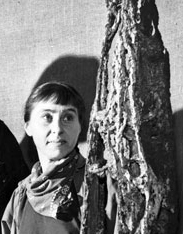Hilda Grossman Morris facts for kids
Quick facts for kids
Hilda Grossman Morris
|
|
|---|---|

Hilda Morris with sculpture, 1959
|
|
| Born |
Hilda Grossman
1911 New York City, New York, U.S.
|
| Died | 1991 (aged 79–80) Orange, California, U.S.
|
| Nationality | American |
| Education | Art Students League, Cooper Union |
| Known for | Sculpture |
| Spouse(s) |
Arthur Deutsch ending in divorce in 1930
Carl Morris
(m. 1940) |
Hilda Grossman Morris (1911–1991) was a talented American artist. She was best known for her amazing sculptures, especially those made from bronze. She was an important part of a group of artists called the Northwest School.
Contents
About Hilda Morris
Early Life and Art Studies
Hilda was born in New York City in 1911. She loved art from a young age. She studied at two famous schools: Cooper Union and the Art Students League of New York.
Starting a Sculpture Program
In 1938, Hilda got a job with the Works Progress Administration (WPA). This was a government program that helped artists during a tough time. She was asked to start a sculpture program at the Spokane Art Center in Spokane, Washington.
While in Spokane, she met other artists like Clyfford Still and Guy Anderson. She also met the painter Carl Morris. Hilda and Carl got married in 1940. They became lifelong partners in art, always supporting each other's work.
Moving to Portland
In 1941, Hilda and Carl Morris moved to Portland, Oregon. Most of Hilda's work was created there. She sometimes traveled to New York City or Pietrasanta, Italy. She went to Italy to cast her large bronze sculptures.
Hilda's art brought new ideas about abstract art to the Pacific Northwest. Her sculptures often showed the rhythms of dance, music, and even mathematics. She focused on how natural shapes are organized. Hilda and Carl were also friends with Mark Tobey, another founder of the Northwest School. He influenced her art, especially with ideas from Eastern calligraphy.
Exhibitions and Awards
Hilda Morris's work helped bring national attention to the modern art scene in the Pacific Northwest. Her sculptures were shown in many important art museums. These included the San Francisco Museum of Art, the Portland Art Museum, and the Seattle Art Museum. Her art was even displayed at the Seattle World's Fair.
In 1960, Hilda received a major award called a Ford Foundation fellowship. She also created large sculptures for public places. Some of these include Muted Harp at the Seattle Opera House and Ring of Time at Standard Plaza in Portland.
Where to See Her Art
Hilda Morris's sculptures are part of many art collections. You can find her work at places like the California Palace of the Legion of Honor and the University of Oregon Museum of Art. Her sculpture Wind Gate is at Reed College.
Later Life
Hilda Morris passed away in 1991 in Orange, California. Years later, in 2006, the Portland Art Museum held a special show of her work. This show celebrated her amazing career.
Images for kids
 | William L. Dawson |
 | W. E. B. Du Bois |
 | Harry Belafonte |


